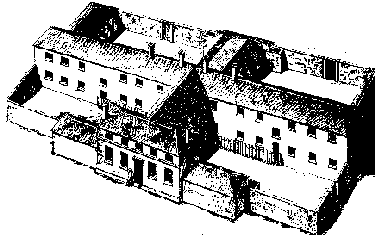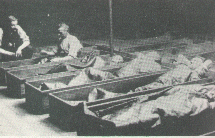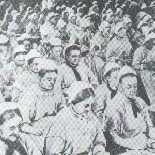

Because of a rise in the population of Britain in the 19th century, it was becoming more and more expensive for parishes to support the poor. The Workhouses were an attempt to solve this.
Before workhouses came into being, the poor were able to stay in their homes and claim parish relief from parish householders. When the 1834 Act came into force anyone receiving parish relief had to go into the workhouse and work for their money.
The 1834 Poor Law Act replaced the Old Poor Law and was deliberately designed to wipe out paupers who were seen to be idle, drunk or just trying to get parish relief.
The workhouse was the last resort for a lot of the poorer families who had genuinely come across hard times. If the breadwinner lost his/her job or fell sick then there would be no wages coming in and the only option they had was to claim parish relief and in return they had to leave their homes and move into the workhouse. Because of the conditions at the workhouse families would try to cope before suffering the degradation of having to go into them.
The workhouse buildings were usually grim looking places and the rules for residents were also designed to make it the last option.
On entering the workhouse, you were stripped, searched, washed & had your hair cropped. You were made to wear a prison-style uniform. If you went out of the workhouse people would recognize the uniform as being from the workhouse.
The inmates rose at 5.00am and went to bed at 8.00pm
One cruel aspect of the workhouse was that they would separate families from one another. Husbands, wives and children would be in separate parts of the workhouse. They were not allowed to meet even in the communal areas.
SOME OF THE WORKHOUSE RULES.
Extract from the Regulations of the Local Government Board 1882 for Casual Paupers
Dietary Table: Supper.
Males above 15 years of age - 8 oz. of Bread or 6 oz of Bread, and 1 pint of Gruel or 1 pint of Broth.
Females above 15 years of age, Children from 7 to 15 years of age - 6 oz of Bread, and 1 pint of Gruel or 1 pint of Broth.
Breakfast - same as Supper.
Children under seven years of age:
For each child under the age of seven months - half pint of Milk and half oz of Sugar. For each child between the ages of seven months and two years - half pint of Milk, half oz of Sugar, and 2 oz of Bread. For each child between the ages of two years and seven years - half pint of Milk, 4 oz of Bread, and half oz of Cheese.
TASKS OF WORK
Casual Paupers who are detained for more than one night:
As regards Males, for each entire day of detention -
The breaking of seven cwt. of Stones, or other such quantity not less than five cwt. nor more than thirteen cwt. as the Guardians having regard to the nature of the Stone, may prescribe. The stone shall be broken to such a size as the Guardians, having regard to the nature thereof, may prescribe; or
The picking of four pounds of unbeaten or eight pounds of beaten Oakum; or
Nine hours' work in digging or pumping, or cutting wood, or grinding corn.
As regards Females, for each entire day of detention -
The picking of two pounds of unbeaten or four pounds of beaten Oakum; or
Nine hours' work in washing, scrubbing and cleaning, or needlework.
PUNISHMENTS FOR OFFENCES
"The Pauper Inmates Discharge and Regulation Act provides that -
Any Pauper who (1) Absconds or escapes from or leaves any Casual Ward before he is entitled to discharge himself there from; or (2) Refuses to be removed to any Workhouse or Asylum under the provisions of this Act; or (3) Absconds or escapes from or leaves any Workhouse or Asylum during the period for which he may be detained therein; or (4) Refuses or neglects, whilst an inmate of any Casual Ward, Workhouse, or Asylum, to do the work or observe the regulations prescribed, or (5) Wilfully gives a false name or makes a false statement for the purpose of obtaining relief, shall be Deemed an Idle and Disorderly Person within the meaning of Section 3 of the fifth George the Fourth, chapter eighty-three.
Every Pauper who (1) Commits any of the offences before-mentioned after having been previously convicted as an idle and disorderly person; or (2) Wilfully destroys or injures his own clothes or damages any of the property of the Guardians, shall be deemed a Rogue and Vagabond within the meaning of Section 4 of the same Act.
An Idle and Disorderly Person may on conviction be sentenced to One Month's Imprisonment with hard labour.
A Rogue and Vagabond on conviction may be sentenced to Three Month's Imprisonment with hard labour."

Men's Workhouse 1880

Lunchtime for women at St Pancras Workhouse
Peter Higginbotham's site on Workhouses - very good site!!
Bawnboy Workhouse - Ireland
 To Victoriana
To Victoriana
 To Home Page
To Home Page